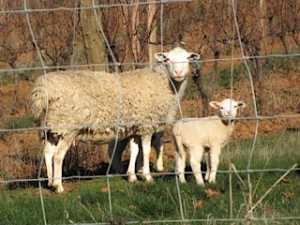 A flock of Katahdin/Dorper crosses are the cornerstone of our fertility management. We use intensive rotational grazing to cycle nutrients from diverse cover crops to the vines. This intermitant grazing creates cycles of root die-off which release and retain microbial life and organic matter. Top dressings of consumed cover crops are carried back to the vine roots by these stimulated microbes and other creepy crawleys. Several years of this practice have lead to a vineyard that needs no fertilizer from outside the farm, creating a unique wine that is truly site specific.
A flock of Katahdin/Dorper crosses are the cornerstone of our fertility management. We use intensive rotational grazing to cycle nutrients from diverse cover crops to the vines. This intermitant grazing creates cycles of root die-off which release and retain microbial life and organic matter. Top dressings of consumed cover crops are carried back to the vine roots by these stimulated microbes and other creepy crawleys. Several years of this practice have lead to a vineyard that needs no fertilizer from outside the farm, creating a unique wine that is truly site specific.
Each Spring the flock is aversion trained. Aversion training is a process where ruminants are trained to avoid a certain plant. In this case, grape vines. We coordinate this training with shoot thinning. Our lambing cycle is timed to take best advantage of the benefits the flock bring to the vineyard. Lambs do not train until about 12 weeks of age. We lamb in January and Early February. The sheep graze the vineyard up to bud swell. Then they are pulled out until we have about 4″ of shoot growth. They are trained and return to the vineyard until the non-irrigated grasses begin to dry out. This is usually mid-July and narrowly misses the onset of color in the fruit by two weeks. Sheep must be out of the vineyard once the fruit begins to turn color. They have been train to grape vines, not grapes. The ewes are bred in August. Once harvest is complete, the ewes return to the vineyard. With this timing implemented properly, we utilize our vineyard as pasture for about 8 months of the year. This provides a a second means of production from one piece of ground, and contributes greatly to the individuality of our wines.
Katahdin are a breed developed back east out of African stock. They are a hair sheep. Each spring they rub out their fleece coats leaving them with an under coat of hair similar to a goat. This means they do not need shearing, a boon to our busy late spring schedule. They are extremely hardy, do well on a pure grass diet, and have low incidences of lambing complications. Dorpers are similar to the Katahdins in many ways with a shorter meatier frame. Both breeds are expressive and vigorous. The humor they bring to this farmer is appreciated on a daily basis.
Mike and Eva are our Akbash Livestock Guardian Dogs. After several years of being at war with mountain lions, we decided there had to be a better way. Indeed, we were being wiped out of the sheparding life. Mike and Eva have provided an elegant and utterly enjoyable solution to a bad situation. Akbash come from herding societies in Turkey. Hundreds of years of selection for function and durability has produced an amazing dog with bred in traits for gentleness and strong bonding to humans and livestock and a will to destroy anything that threatens those they bond to. They are powerful,extremely agile, and very fast. Mike and Eva live with the flock 24 hours a day and happily ward of any potential threats. They love their work and are admirable beasts of extreme character, loyalty, and ethic. They also accompany our children on their forays deep into the surrounding woods. I have come to deeply admire these dogs for their loyalty and code of ethics.
For information on available sheep, breeding stock and grass-finished lamb please feel free to contact Stephen directly.

